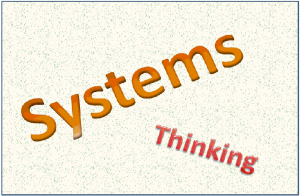Systems Thinking
 Systems thinking is a management discipline that concerns an understanding of a system by examining the linkages and interactions between the components that comprise the entirety of that defined system.
Systems thinking is a management discipline that concerns an understanding of a system by examining the linkages and interactions between the components that comprise the entirety of that defined system.
The whole system is a systems thinking view of the complete organisation in relation to its environment. It provides a means of understanding, analysing and talking about the design and construction of the organisation as an integrated, complex composition of many interconnected systems (human and non-human) that need to work together for the whole to function successfully.
Whole systems are composed of systems, the basic unit, which comprise several entities (e.g. policies, processes, practices and people) and may be broken down into further sub-systems.
Systems may be thought about as having clear external boundaries (closed) or having links with their environment (open). An open systems perspective is the more common and realistic.
The boundaries of a whole system may be chosen and defined at a level suitable for the particular purpose under consideration; e.g. the education system or a complete school system.
Similarly, systems can be chosen and defined at different levels and can operate alongside each other as well as hierarchically; e.g. the finance system, the decision-making system, the accountability system.
An organisation as an entity can suffer systemic failure. This occurs in the whole system or high-level system where there is a failure between and within the system elements that need to work together for overall success.
Factors in systemic failure may include confused goals, weak system-wide understanding, flawed design, individual incentives that encourage loyalty to sub-ordinate (rather than super-ordinate) goals, inadequate feedback, poor cooperation, lack of accountability, etc.
Whole system success requires a performance management system that is pitched above the level of individual systems and their functional leadership. Features may include group or team-level goal-setting, development, incentives, communication, reviews, rewards, accountability. The aim is to focus on what binds individuals together and what binds systems together rather than functional silo performance.
A whole system can succeed only through managers collaborating in and across a number of functional systems. The whole system can fail only if leadership at the level of the whole system fails, and where several senior managers are involved. Hence, such failure may be labelled a systemic failure of leadership.
In cases of systemic failure, individual executives who operate at a lower sub-system level may be free of responsibility and blame. They may argue (correctly) that it was the wider system that failed. They may claim that particular systems that integrate with their own work let them down. However, responsibility and accountability for the successful design and running of the (integrated) ‘whole system’ should rest somewhere.
Understanding and anticipating how the whole system is intended to work, actually works, and how it may buckle under pressure, can practically elude and defeat most executives. To avoid censure for this tough challenge, they sometimes seek recourse to the, often hollow mantra “lessons will be/have been learned”. They also try to divert attention and reassure investors by referring to a single bad apple (e.g. a ‘rogue trader’), behind which usually lurks a systemic failure.
The leadership challenge is accentuated by the realisation that for every legitimate, official or consciously designed system (which is intended to be and is supposedly rational) there is a shadow system. The shadow system is where all the non-rational issues reside; e.g. politics, trust, hopes, ambitions, greed, favours, power struggles, etc.
The system can confuse, overpower, block, and fail leadership. But leadership can fail the system. A major failure of leadership within, across or down an organisation is referred to as ‘systemic’.
